Faculty of Humanities Department of Religious Studies Contributing to a harmonious society through profound religious knowledge
English translation in progress. Thank you for waiting.
Contents
Department Overview
This Department is suitable for the following people:
- Those interested in Tenrikyo and world religions
- Those aiming for a career path within Tenrikyo
- Those interested in becoming scholars of religious culture
Learning Key Points
01. Emphasis on “practicality” and “modernity”
The two pillars of study are subjects related to Tenrikyo studies and subjects related to religious studies. We offer a full range of contemporary themes of study that respond to students’ interests and needs, and they can acquire the “practicality” and “modernity” necessary for careers related to Tenrikyo.
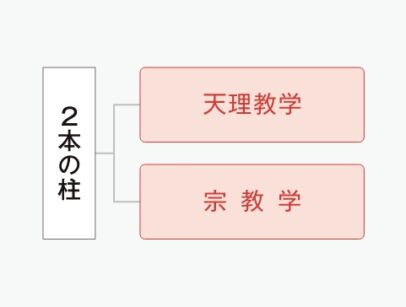
02. Clarify your future vision with our three enrollment models
1) Positions within Tenrikyo (church head minister, missionary, etc.).
2) Employment in a company or advancement to graduate school.
3) Acquisition on a teaching license (Religious Studies) for junior high school or high school.
The enrollment model for each of the main possible career paths allows students to study with a clear vision of their future.
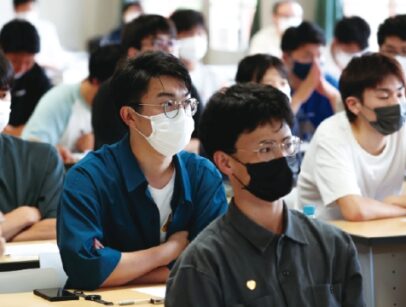
03. Four precious years of learning in “Jiba”
Students can immerse themselves in learning at Jiba, with fellow students gathered from all over Japan. Inheriting the thoughts of our founder, Shozen Nakayama, the second Shinbashira of Tenrikyo, the four years at this University will be a valuable time for students to reaffirm the essence and significance of Tenrikyo.
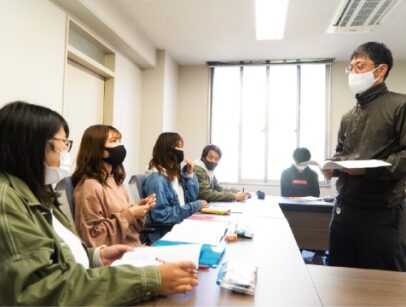
Enrollment models and qualification models to make the most of your learning for the future
“Missionary Course” qualification model
Practical mastery of the learning required for positions within Tenrikyo (church head minister, missionary, etc.).
We encourage students to complete the “Missionary Course,” a qualification course aimed at training Yoboku to engage in missionary work in Japan and overseas.
- Future vision: Positions within Tenrikyo (church head minister, missionary, etc.).
“Bachelor of Religious Culture” qualification model
This model is mainly for students who wish to pursue a career path other than a practical position within the teaching profession, such as employment in business or government, or entering graduate school.
We encourage our students to obtain the certification “Bachelor of Religious Culture.”
- Future vision: General employment and continuing onto graduate school.
“Teaching” qualification model (Religious Studies)
This course if especially designed for students who wish to become teachers of “Religious Studies” in Tenri Junior High School and Tenri High School and aims to obtain a First Class Junior High School Teaching License (Religious Studies) and First Class High School Teaching License (Religious Studies).
- Future vision: Religious Studies teacher at Junior High School and High School.
Four-year learning process
First-year
続きを読むAcquire basic knowledge and “attitude” to learn
① Basic knowledge of Tenrikyo and religion
② Basic reading and writing skills
③ Develop an attitude of “thinking for oneself”
Representative Classes
 ・Introductory Seminar in Religious Studies
・Introductory Seminar in Religious Studies
Students will develop the ability to “think for themselves” through reading long texts, which are different from those on social networking sites, and writing reports that clearly distinguish between their own opinions and those of others, with a focus on literature related to Tenrikyo and religion.
Second-year
続きを読むDeepen your understanding and uncover your own interests
① Deepen basic knowledge of major topics in Tenrikyo and religious studies.
② Develop the ability to read more deeply.
③ Foster the ability to develop one’s own idea.Representative Classes

・Seminars to read and comprehend Tenrikyo Scriptures and contemporary religion
In the former, students study the original texts of Tenrikyo in a lecture format, and in the latter, they study the relationship between religion and politics, economics, science, and life and culture, as well as contemporary society from a religious perspective in a seminar format.
Third-year
続きを読むDeepen your study of specialized topics
Students learn specialized vocabulary (concepts), theories, and historical context in each “Special Lecture” and acquire perspectives and methods of text interpretation through close reading of classical literature in each “Seminar.”
Representative Classes
 ・Research Seminar on Religious Studies 1, 2
・Research Seminar on Religious Studies 1, 2
Classes are divided into two areas, Tenrikyo Studies and Religious Studies, with close reading and presentation of classic texts from each area. Students will learn how to understand the literature and materials and verbalize their own views.
Fourth-year
続きを読むWork on a graduation thesis as the culmination of your studies
Work on a graduation thesis as the culmination of your studies
【Examples of graduation thesis themes】- 慰霊と追悼ー沖縄戦の記憶からー
- Memorials and Remembrance – from the Memory of the Battle of Okinawa- - 「血盆経」の受容と日本の女性観
- The Reception of the “Blood-Bowl Sutra” and the Japanese View of Women - サブカルチャーと宗教ーなぜ聖地巡礼なのかー
- Subcultures and Religion: Why Pilgrimage to Holy Places? - 辻忠作の説いた「かしもの・かりもの」の教理
- - The teaching of “A thing lent, a thing borrowed” as preached by Chusaku Tsuji
- 地域の拠点としての天理教会の新たな取り組みー子ども食堂を通してー
- Tenrikyo Churches Engaging in New Efforts as a Community Base through the Children’s Cafeteria-
- 慰霊と追悼ー沖縄戦の記憶からー
Employment Results and Qualifications
Employment Rate 86.7%
※Actual employment results for graduates of the Department of Religious Studies, Faculty of Human Studies in March 2025
Major employers (information for the most recent 5 years)
Ichijo Co., Ltd., Ohtori Kogyo Co., Ltd., Nagoya Dairy Co. (Sujata), Seiren Co., Ltd., U-NEXT Co., Ltd., Goto Kaisoten Ltd., As-me ESTELLE Co., Ltd., Osaka Toyopet Co., Ltd., Bridgestone Retail Japan Co., Ltd., Fuji Yakuhin Co., Ltd., Nanto Bank Ltd., Osaka Kosei Shinkin Bank, Eslead Corporation, Gift Holdings Inc., Aqua Tec Co., Ltd., Tenrikyo-related, Fire Department (Gobo City), Imperial Guard Headquarters (National Public Servants), Police (Osaka Prefectural Government), etc. (listed in no particular order)
Available Qualifications
- First Class Junior High School Teaching License (Religious Studies)
- Qualification for appointment as a social welfare administrator
- Japanese language teacher
- First Class High School Teaching License (Religious Studies)
- Librarian
- Corrections and Rehabilitation
- Bachelor of Religion and Culture (Qualification for Examination)
- Museum curator
- Missionary of the Tenrikyo church
Faculty list
Curriculum
Curriculum tree(PDF)
Curriculum map(PDF)
Education Policy
Admission Policy
In order to fulfill the educational goals of the Department of Religious Studies, we seek for students with the following qualities:
1. (Skills) Those who desire to acquire information gathering skills necessary for religious studies research.
2. (Knowledge) Those who desire to acquire basic knowledge regarding Tenrikyo and various religions around the world.
3. (Thought) Those who have an interest in the basic teachings of Tenrikyo as well as those of various religions around the world.
4. (Motivation) Those who are motivated to actively engage in religious studies research.
5. (Attitude) Those who can understand other people’s religions and beliefs, respect diversity, and are able to live alongside those who have different values.
6. (Action) Those who can work in the local community and in regions both within and outside Japan with the spirit of “dedication to others.”
7. (Motivation) Those who have had experience in actively engaging in social activities and extracurricular activities and have an interest in religion.Entrance examination methods will take various forms, such as comprehensive selection, special
selection, school recommended selection, general selection, and transfer selection.Curriculum Policy
We offer subjects that cover fundamental theories of religion and the historical development and thoughts of the world’s major religious traditions, as well as subjects on the scriptures, teachings, and history of Tenrikyo. Based on the acquisition of such basic and historical knowledge, we offer subjects focusing on the present-day significance and role of Tenrikyo and other religious traditions in the modern world. This multifaceted and practical curriculum is designed to cultivate individual faith, enrich each student’s character, while enhancing their knowledge of religion, including Tenrikyo, and developing their critical thinking skills.
The classes are organized so that students will gradually deepen their understanding.
For instance, during the first year, students study introductory seminars and basic subjects; during the second year, developmental seminars and advanced subjects, and during the third year, students will enroll in research seminars and advanced subjects. Furthermore, during the third and fourth year, the curriculum is organized so that students can take seminars that cover the overall studies, which will prepare them to write their graduation thesis.Diploma Policy
A bachelor's degree (Religious Studies) will be awarded to students who have acquired the following knowledge and abilities:
1. (Skills) Those who have acquired the Japanese language and foreign languages necessary for researching religions, as well as the ability to gather information.
2. (Knowledge) Those who have acquired basic knowledge about Tenrikyo as well as various religions in the world, and as a result of that, have gained broad views.
3. (Thought) Those who have an interest in the basic teachings of the major world religions and Tenrikyo, as well as have the ability to create assignments through information collection and analysis.
4. (Motivation) Those who can make good use of the knowledge gained and have a good command of the methodology of research and can actively engage in religious studies research.
5. (Attitude) Those who can understand other people’s religions and beliefs, respect diversity, and are able to live alongside those who have different values.
6. (Action) Those who can work in the local community and in regions both within and outside Japan with the spirit of “dedication to others.”

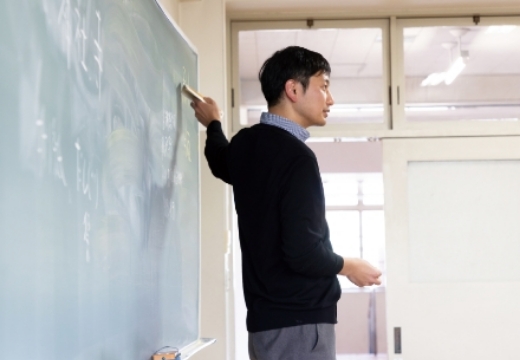 ・Introductory Seminar in Religious Studies
・Introductory Seminar in Religious Studies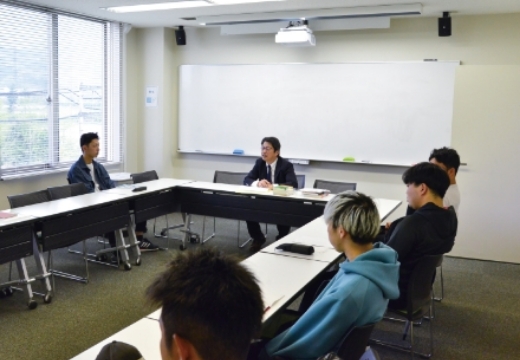
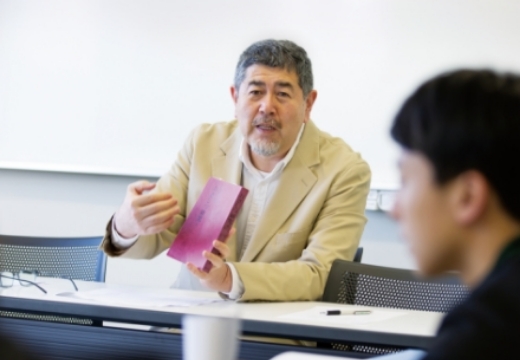 ・Research Seminar on Religious Studies 1, 2
・Research Seminar on Religious Studies 1, 2